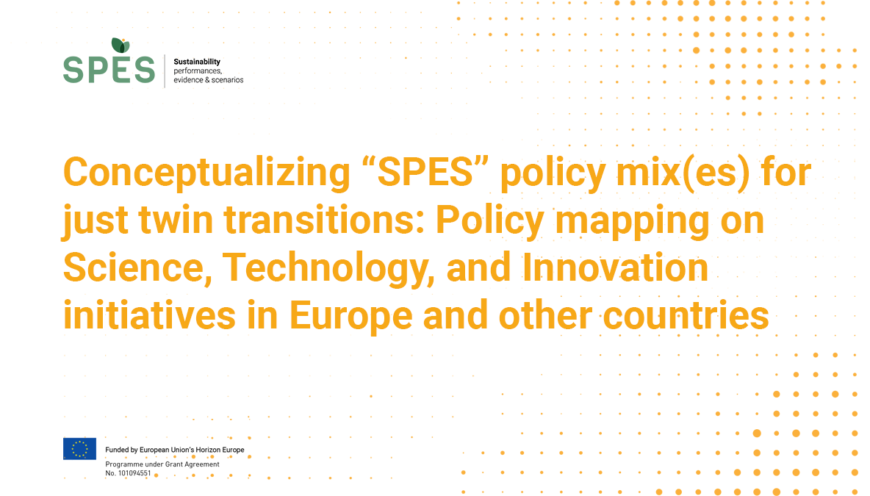The twin transitions—the green transition towards sustainability and the digital transition towards technological advancement—have become central to policy debates in Europe and beyond. The European Green Deal, a cornerstone of the European Union’s strategy, aims to achieve a climate-neutral Europe by 2050. This initiative highlights the interconnectedness of environmental sustainability and digital innovation, underscoring the importance of integrating these transitions to drive economic growth, competitiveness, and social inclusiveness. SPES Report 5.1 “Conceptualizing “SPES” policy mix(es) for just twin transitions: Policy mapping on Science, Technology, and Innovation initiatives in Europe and other countries” aims to provide a comprehensive overview of the landscape of Science, Technology, and Innovation (STI) policies, particularly those supporting the net-zero transition. By focusing on both European Union member states and select non-European countries, their analysis seeks to understand the different approaches to combining innovation with environmental and social sustainability goals.
Green and digital transitions are at the center of the recent policy debates.:
- The green transition aims for a sustainable shift in how we produce and consume, focusing on climate change mitigation and preserving biodiversity all while ensuring an equitable process.
- The digital transition, meanwhile, is transforming societies and economies, promising increased prosperity and solutions to societal issues, but also bringing risks like social disruptions, inequality, and security threats.
By integrating these two transitions, the EU seeks to drive innovation, competitiveness, and social inclusiveness, while ensuring that the digital transformation supports its environmental and climate objectives. Moreover, the EU has been a pioneering force in articulating and promoting the idea of a just twin
transition by integrating the principle of fairness and the imperative to ensure that no one is left behind in these transformative processes.
The overview of the landscape of policies addressing science, technology and innovation (STI policies), and the policies promoting the net zero transition. focuses both on the European Union, on its individual member countries and extends the observation to non-European countries, The policy mapping has been conducted referring to the Science, Technology, and Innovation Policy (STIP) Compass, which is a joint initiative of the European Commission and the Organization for Economic Co-operation and Development (OECD). The STIP Compass is a database that includes STIP policies and interventions aimed at net zero transition implemented by various OECD countries. To analyse these policies, Researchers used the Quintuple Helix framework developed in the SPES project.
Looking at the national policies for science, technology and innovation contained in the STIP Compass database, Researchers notice that productivity initiatives form a significant part of science, technology and innovation policies. This is particularly true in low and middle-income countries, in which national policymakers focus on productivity to better compete and integrate into the global economy. In contrast, higher-income countries, most of them now de-industrialised countries, use a diverse policy mix, targeting productivity, environmental and social sustainability giving a new perspective to the concept of
“sustainable productivity”.
Several European countries place relatively more emphasis on environmental sustainability, funding research and innovation in clean technologies and other related areas. Many of these policies are also pursued at the EU level. In addition to innovation and environmental sustainability, national science, technology and innovation policies implemented in the EU Member States also support the participation and empowerment of citizens, businesses and research organisations.
The incidence of science, technology and innovation policies focusing on equity and human security is relatively limited. Many of these policies refer to measures to ensure gender equality in research, access to education, training or research for certain groups of citizens, or the promotion of safety and ethics protocols in research. Even fewer countries have policies that combine innovation and environmental sustainability (the twin transition) with equity or together with the promotion of human security.
To access Report 5.1 and read more methodologies, analysis and results
The Report 5.1 “Conceptualizing “SPES” policy mix(es) for just twin transitions: Policy mapping on Science, Technology, and Innovation initiatives in Europe and other countries” is part of Task 5.1 “Policy mapping” / Work Package 5. The report has been written by Annalisa Caloffi,Associate professor and researcher of the SPES Project, University of Florence; Luca Lodi, – Researcher of the SPES Project, University of Florence; Prof. Mario Biggeri, Scientific coordinator of the SPES Project, University of Florence.




